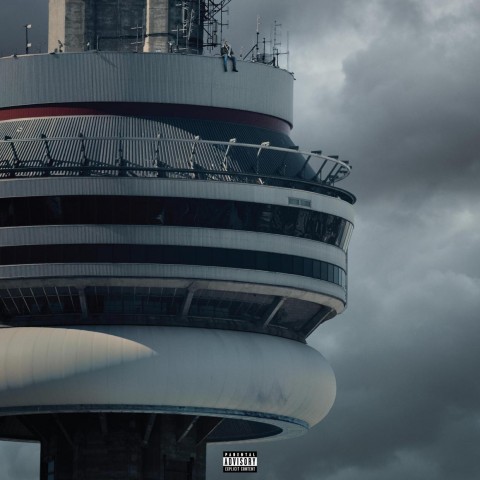Drake’s New ‘Views’ Look All Too Familiar
Star stagnates on long-awaited fourth LP

The album cover of Drake’s ‘Views’ features the rapper sitting on Toronto’s CN Tower.
Drake’s fourth album arrives at a time when the pop world is still in a state of shock, reeling from the tragedy of Prince’s death and the triumph of Beyoncé’s return. Yet if Views is not the cohesive, genre-redefining revelation that some hoped it might be, the blame lies with squarely Drake. He is, after all, the one who set the bar so high.
In the seven years since the release of his seminal mixtape So Far Gone, Aubrey Drake Graham has, with the help of his chief collaborator Noah “40” Shebib, gone from outsider to center of the popular music universe. He’s subverted hip-hop stereotypes and reshaped the pop landscape in his own image. He is a hitmaker, he is a force, and he is a meme ”“ all things that make him virtually unassailable in a climate where personal indignities are overlooked and forgotten as long as the music is hot. And the music has been consistently hot.
His formula? Rap, sing, brag, emote, confess, seduce, reflect, lament ”“ then repeat. Sonically, he and 40 have perfected a woozy, submerged sound that filters out the high end of beats to place the vocalist in the foreground as lead instrument. Theirs is a sound that is often imitated nowadays: Thanks to Drake, rappers have increasingly become indistinguishable from singers and vice versa. This sound has taken Drake to the top of the charts and the center of fans’ consciousnesses, but on Views, that formula fails to decisively take listeners anywhere we’ve never been before.
The clearest sign of stagnation is his subject matter. The album opens on a cold, somber note with “Keep the Family Close,” where we find the world’s most successful sad boy lamenting the absence of supposedly down-ass chicks who didn’t stay down. “All of my ‘let’s just be friends’ are friends I don’t have anymore/How do you not check on me when things go wrong?/Guess that’s what they say you need family for/’Cause I can’t depend on you anymore.” Sparse strings, organs and bass set the tone for his melancholy. Though the sentiment is surely genuine, by this point in his career the “Why didn’t you wait for me?,” “Why aren’t you still down?,” “We could’ve had something,” “Dare you move on with your life” Drake of “Hotline Bling” and of the scornful last two minutes of What a Time to Be Alive‘s “Diamonds Dancing” is all too predictable. In a 2009 interview, Drake spoke about the inspiration for So Far Gone‘s title, attributing it to a realization about how consumed by the money and women he and his circle were becoming. According to Drake, in a moment of self-awareness, he and his friend and business partner Oliver El-Khatib questioned whether they were becoming “the men their mothers divorced.”
In 2016, it seems as if the sliver of self-awareness he had in the So Far Gone days has been totally eclipsed by self-absorption. On “Redemption,” Drake croons “I know you seein’ someone that loves you/And I don’t want you to see no one else” (someone other than him that is). His singing on “Redemption” is one of his best vocal performances to date, but though his voice is sweet, his words are bitter, recalling “Marvins Room” from years back. On “U With Me,” he dog-ears a page from DMX’s book, using a snippet of “What These Bitches Want?” and interpolating X’s “How’s It Goin’ Down” on the hook to tell the tale of back-and-forth head games with an ex-lover. However, the closest he comes to admitting emotional injury from these interactions is stating his annoyance, singing, “‘Are you here?’ text without an invite/That’s that shit I don’t like.” If Drake aspires to be the paragon of masculine vulnerability and honesty, he’ll need to dig deeper than this surface-level soul-searching.
In his Thursday interview with Beats 1’s Zane Lowe, Drake remarked that he wanted to ” ”¦ create distance between myself and everyone else” with Views. The album is intended to separate him from the growing number of artists who are successfully replicating his formula. But the distance he’s looking to establish isn’t coming from his lyrics as much as it is his sound. What his lyrical content lacks in maturity, 40 and his producers make up for with musical experimentation.
Whether you regard Drake as a cultural interloper or just a keen observer, you can’t deny that he and his team are adept at assimilating and reinterpreting regional sounds. Never forget that this is a kid from Toronto who infused his music with the style and swagger of Houston’s rap scene. Now, as he’s turned his attention to places like London, Kingston and Lagos, his musical palette has been replenished with danceable uptempo music from the African diaspora. Songs like “Controlla,” “One Dance” and “Too Good” incorporate the sounds of reggae, Afropop and U.K. Funky and are the album’s standout moments. Though reggae star PopCaan is missing from the LP version of “Controlla,” we get a welcome surprise in the form of snippet of Beenie Man’s Urkle Riddim jam “Tear Off Mi Garment” in the middle of the song. “Too Good” is another island-inflected song that once again pairs Drake with Rihanna, who delivers an excellent vocal performance, playing the role of frustrated but emotionally entangled lover.
Drake told Lowe that “the album is based around the change of the seasons in our city. ”¦ Winter to summer and back to winter again.” If the cold, callous and possessive character heard on much of Views represents the LP’s forgettable winter, the warmer vibes of his flirtations with international dance music are far more welcome. At this stage, it would seem that Drake’s Views are particularly one-sided: Perhaps he could use a look in the mirror.







